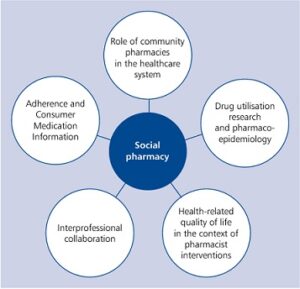The pharmaceutical sector has had a rapid upsurge in the recent years because to the discoveries of numerous life-saving medications. Numerous new work prospects are emerging, particularly in the pharmaceutical industry, as the medical field is teeming with ground-breaking research and innovations. The most common programmes for people interested in pursuing a degree in this field are, the Bachelor of Pharmacy, M Pharm, and PhD in Pharmacy. However, you should take the Diploma in Pharmacy into consideration if you want to choose a quick-term yet focused course. And doing this course from IIMT University Meerut, known as the best private university in Meerut U.P. will give your career the right boost. Now, let’s examine what D Pharmacy entails, the best universities you may attend, and the employment opportunities it provides.

Why D Pharmacy?
- D Pharmacy can help you acquire a career in both private and public hospitals or retail establishments.
- Positions as a chemist are available at facilities like NGOs, health clinics and community healthcare clinics, where you can verify the prescription and administer medication.
- Major pharmaceutical corporations employ people for a variety of functions, including process controller, manufacturing head, and quality controller.
- The position of medical representative is quite appealing and pays well.
- Open your own pharmacy to offer medications in bulk or other things for use in medicine or surgery
- As you gain experience, you can develop your interpersonal abilities and boost your profile.
- Who Should Undertake a D Pharmacy?
- Pharmacy degree is required by those who want to work in the healthcare industry.
- Candidates who want to begin with a diploma study and pursue a career in the pharmaceutical business can apply for admission to the D Pharma programme.
- Candidates may register in both MBA in Pharmaceutical Management and a D Pharmacy programme.
- SKILLS
The following lists the skills that pharmacists must possess.
- Keeping accurate records in accordance with FDA’s Food and Drug Act
- Prescriptions are processed safely and correctly.
- Pharmaceutical compounding and dispensing
- Inventory management, merchandising, and purchasing
- Process for approving drugs
- Regulatory standards for drug testing, screening, and clinical trials
- Legal Aspects of Pharmaceuticals
- Patient-provider connections
- Controlling narcotics
- Independent Billing
- Electronic processingRole of pharmacist in social pharmacy
Pharmacy studies are combined with the concepts and the strategies from social, psychological, and humanistic fields in social pharmacy. The impact of medicine on people and society is significant. Optimal drug use is essential for society in order to provide access to essential pharmaceuticals and to prevent misappropriation and other sorts of irrational use that can be expensive as well as detrimental to the health of the general people.
Understanding the impacts of pharmaceuticals has emerged as a major goal for the society, as well as for policy makers and decision-makers. This is demonstrated by the increased research interest over the past 10 years on the role that drugs and the pharmaceutical industry has played in the modern society.
Social Pharmacy as the Multidisciplinary field
- The multidisciplinary field of teaching and study known as social pharmacy covers the social, psycho-social, economic, and organisational elements of medicine.
- It is focused on the function, availability, control, and application of drugs in society.
- It examines medical policy choices made at the municipal, state, federal, worldwide, and universal levels.
- It addresses a variety of subjects, such as the usage and distribution of medications, economics & funding, and decision-making.
- Health performance & acquaintance,
- Health attitudes, health literacy, as well as health and pharmaceutical policy, pharma co-informatics, ethics, are all important factors to consider.
- Drug-related epidemiology.
- Pharma co-
The field of community apothecary is motivated by societal demands. By investigating the relationship between pharmacy and society, particularly through case studies, the impact of drugs and changes in societal expectations of them, as well as through historical background studies and surveys of current trends, this discipline seeks to determine the roles of chemists and chemists expected by the society. Basic knowledge of pharmacological science is necessary for social pharmacy, but it’s also crucial to have an awareness of the current healthcare systems and structures from an economic perspective. Once these are recognised, the goal is to identify social problems, create and put into practice solutions for solving them that link pharmacy and society together. Up until now, social pharmacy has played a prominent role in the training programmes for pharmacists who work in the neighbourhood pharmacies.
- Indian social pharmacy’s present state
The World Health Organisation (WHO) has long believed that chemists would make a greater contribution to the delivery of health care, so over the last few decades, social pharmacy has been incorporated into pharmacy curricula and training in developed countries to give pharmacy graduates more opportunities that promote constant interaction.
In the vast majority of emerging countries, including India, the concept of social pharmacy—the crucial training that enabled chemists from affluent countries to become front-line practitioners—is still unheard of! The pharmaceutical profession’s least developed area is pharmacy practice, or social pharmacy under pharmacy practice, according to an overview of current research on India’s pharmacy schools. It is noteworthy that social dispensary is not particularly covered in the recently launched D.Pharm curriculum.
- Research on the health system or services
Research on the health system or services, sometimes known as HSR, is connected to the social pharmacy research. HSR is primarily concerned with enhancing community health. HSR aims to give community leaders and health managers at all levels the pertinent data they require to make decisions regarding the issue they are dealing with. Consequently, it is focused on comprehending and enhancing pharmacy practice as well as a society’s usage of medicine. The investigation in societal drug store typically uses both quantitative such as surveys and qualitative methodologies like focus groups, interviews, and observation. It is interesting to note that scholars primarily engaged in experimental research frequently criticise social pharmacy research conducted in underdeveloped nations, especially India, as questionable research in the pharmacy area. Other social research schools view these judgements as irrational. This group believes that in order to enhance the health of the general people, it would be more important to examine the cost-effectiveness of already available pharmaceuticals (a societal apothecary speciality). In terms of pharmaceuticals, there is a need for research that goes beyond the lab. To address the underlying causes of medical and pharmaceutical problems, research on the social, economic, and policy aspects of medicine usage may provide innovative approaches and effective techniques.
- Conclusion:
Social pharmacy subject is included in the syllabus of Diploma in pharmacy (D. Phram) 1st year to make the student aware about their role as pharmacist in the society and how can they help and stand in the upbringing the modern technologies & build the strong connection between the society and his profession. They are essential in informing patients about their medications, keeping track of drug safety, and collaborating with other medical experts to improve patient care.
The motive of this subject is to aware the society about the proper living standard, maintaining hygiene, family planning, mother and child health, proper diet & Nutrition, Female sanitisation and product use in limited sources for the prevention of Harmful diseases like, T.B ,Cancer, Nutrition deficiency , Alcoholism awareness etc.
For example, social pharmacy has benefited a variety of educational efforts for elementary and middle school children as well as community pharmacies’ health management programmes, which are designed to enhance residents’ health. These programmes teach community-based pharmacists, which is crucial in today’s hyper-aged world.

